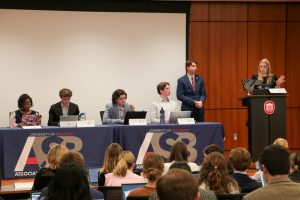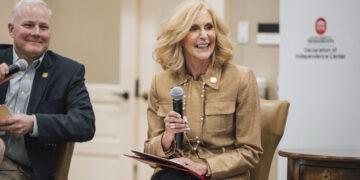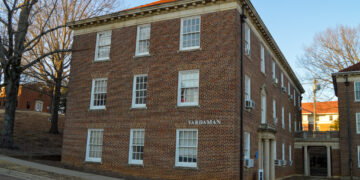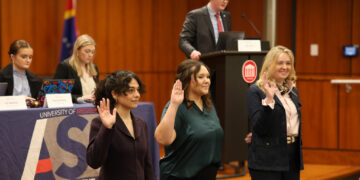
The Associated Student Body put students’ physical well-being at the forefront of their most recent senate meeting, passing resolutions that promote accessibility accommodations and suicide prevention on Tuesday, March. 5.
ASB passed Resolution 24-4, which encouraged the University of Mississippi to install barriers and suicide prevention signage in residential parking garages.
Authored by Sen. Blake Williamson, a sophomore chemistry and biology major, and Sen. Riley Rushing, a junior kinesiology major, the resolution was introduced in response to the death of junior Sawyer Megehee last semester on Oct. 27, 2023.
“It’s really important that we’re implementing this and (are) able to speak up for the student body to show them that we care about them,” Rushing said. “We want to know what’s going on in their minds.”
Other Mississippi schools, such as the University of Southern Mississippi, recently passed legislation in response to similar tragic incidents in their community, influencing ASB senators to author the resolution. The resolution features over 30 different sources for funding.
“There’s going to be a lot of admin, staff and faculty communication that’s going to be needed in the future,” Rushing said. “We also would probably incorporate working with mental health counselors or other (authorities) on campus to create messages (on the signage) that are informative, encouraging and destigmatizing.”
The resolution passed with unanimous approval.
Sen Yasmine Ware, a sophomore international studies major, emphasized the importance of the resolution.
“There is a huge stigma, especially in Mississippi, about (mental health),” Ware said. “I think as a university, and especially as the Associated Student Body, we should be doing everything in our power to let the students know that they’re loved and supported. It could be your classmate next to you, and you will not know sometimes until it’s over.”
Three other resolutions were also presented on the floor. Resolution 24-2 proposed the addition of an online form to the university website through which reports can be made about physical barriers that hinder accessibility on campus. Previously, students had to email the Equal Opportunity and Regulatory Compliance Office to express accessibility concerns.
Sen. Caleb Ball, a junior political science major, authored the resolution and believes the feature will be more convenient for students.
“Adding (the online form) on the website will be a centralized place to go and make reporting these problems easier on campus,” Ball said.
The resolution passed with a unanimous vote.
Resolution 24-3 encouraged students to provide recommendations for institution-wide developments and improvements regarding the quality of student life. The student opinion form is currently the outlet used for students to submit any concerns, and the resolution proposed that the form be broadcasted on campus TVs.
“It came to our attention that some people do not have access to cell phones, or they just don’t realize that ASB has a strong connection with the student body,” Ball said. “So, what we are wanting to do is encourage people to give more opinions to us so that we can be inspired to make more legislation that caters to them.”
With unanimous vote, the resolution passed.
Another unanimously passed resolution, 24-5, was authored by graduate student and Sen. Hayleigh Lutz. The resolution encourages the university to implement a day of asynchronous learning on Election Day.
“For the past couple of years, the University of Mississippi has earned the distinction of a voter-friendly campus, and we’re working towards getting a higher distinction through the campus vote project,” Lutz said.
Lutz said that having asynchronous classes on Election Day would enable more students to cast their votes.
“This allows students who live in the Delta or live on the coast of Southern Mississippi to go home and vote on Election Day without having to miss class,” Lutz said. “This would increase accessibility to the polls and increase and encourage students to participate in civic engagement opportunities.”

























